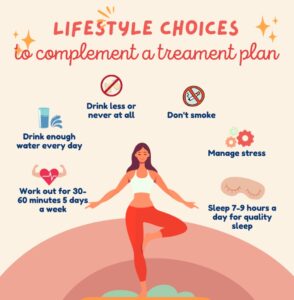Untreated or improperly managed depression can feel like an endless cycle. It can drain you of your energy, happiness, and drive, making you feel stuck in a haze of sadness and hopelessness. The weight of that emotional load can impact every part of your life—your relationships, work, and even your physical well-being.
- Understanding Depression and Its Impact
- The Power of the Right Treatment Plan
- Medication for Major Depressive Disorder Treatment
- Therapy: The Core of Successful Treatment
- Lifestyle Changes for Long-Term Relief
- Alternative and Complementary Treatments
- The Role of Professional Guidance in Choosing the Right Plan
- Conclusion
And yet, it doesn’t have to be this way. With the appropriate treatment plan, you can leave the shackles of depression behind and change your life for the better.
In this article, we will discuss why choosing the proper treatment for depression, especially Major Depressive Disorder (MDD), is crucial for long-term recovery and how it can enhance your well-being.
Understanding Depression and Its Impact
Depression is not merely sadness for a couple of days. It’s a severe mental health disorder that touches the lives of millions of Americans each year. Major Depressive Disorder (MDD), a common type of depression also known by its clinical name, is a pervasive depression that can interfere with one’s ability to carry out normal daily activities.
The symptoms extend beyond feelings of sadness. MDD sufferers tend to have physical manifestations like fatigue, insomnia, loss of appetite, and an unrelenting feeling of hopelessness. It also causes difficulty concentrating and decision-making, so simple tasks become huge obstacles.
The impact of depression is not limited to the individual. Depression can put pressure on relationships with family, friends, and colleagues. Depression usually results in withdrawal, where the person feels that they are not understood or cannot open up to others about their inner turmoil. This withdrawal increases the feeling of hopelessness, making it even more difficult to ask for help. If left untreated, depression can also lead to poor physical health, as the person neglects self-care, misses meals, or refuses to exercise.
The Power of the Right Treatment Plan
A customized treatment plan for depression is the solution to enhancing mental well-being and taking back control of your life. No two individuals have the same experience with depression, and thus no two treatment plans should be identical. The correct method will differ based on the severity of the depression, its causes, and the individual’s own preferences. That’s why a customized treatment plan is essential for long-term results.
There are many methods to treat depression, and the ideal plan will usually incorporate a combination of a few different approaches to treat all facets of the disorder.
Medication for Major Depressive Disorder Treatment
Major Depressive Disorder treatment involves antidepressants. Antidepressants function by keeping the brain chemicals that influence mood, including serotonin and norepinephrine, in equilibrium. For most individuals, antidepressants help with a dramatic alleviation of symptoms of depression and make them more emotionally stable.
However, finding the right medication can be a trial-and-error process. Different types of antidepressants work in various ways, and not every medication is suitable for every person. Some common classes of antidepressants include selective serotonin reuptake inhibitors (SSRIs), serotonin-norepinephrine reuptake inhibitors (SNRIs), and tricyclic antidepressants (TCAs).
Your doctor will consider your medical history, the severity of your symptoms, and your response to past treatments when determining which medication is best for you.
While medication may be very useful, it is not magical. Medication is most effective when it is used in addition to other treatments such as therapy and changes in lifestyle.
Therapy: The Core of Successful Treatment
Therapy is also a critical element in an overall treatment plan for depression. Cognitive-behavioral therapy (CBT) is one of the most effective and commonly used types of therapy to treat depression. CBT identifies and changes depressive thought patterns and behaviors that fuel depression with more positive, more productive ways of thinking. It teaches people methods of coping with stress, resiliency skills, and changing negative self-talk patterns.
Beyond CBT, other forms of therapy are also helpful. Psychodynamic therapy, for instance, assists in uncovering past experiences and how they could be causing depression at present. Interpersonal therapy (IPT) addresses enhancing communication skills and relationships, which can assist in overcoming social issues that most of the time worsen depressive symptoms.

Lifestyle Changes for Long-Term Relief
Aside from therapy and medication, lifestyle also has a crucial role to play in the management of depression. A healthy lifestyle can maximize the efficacy of depression treatment by promoting overall physical and mental well-being. Exercise, for example, has been found to increase one’s mood through the release of endorphins, the body’s natural “feel-good” drugs. Exercise also minimizes stress, promotes better sleep, and raises energy levels.
Nutrition is also important for mental health. A healthy diet with adequate vitamins and minerals can aid brain function and stabilize mood. Omega-3 fatty acids, which are present in fatty fish and some plant foods, have been found to decrease symptoms of depression. Excessive alcohol and caffeine use should also be avoided, as these chemicals can harm sleep and mood stability.
Sleep is also a vital element in the control of depression. Insomnia and oversleeping are common in depression and both exacerbate symptoms. Establishing good sleeping habits, including getting up and going to bed daily at the same time, can help improve sleep and alleviate depressive symptoms.
Alternative and Complementary Treatments
Though standard treatments such as medication and therapy are the mainstay of depression treatment, others find relief through alternative therapies. Mindfulness practices, including meditation and yoga, can assist individuals in developing a sense of calm and present-moment awareness, which diminishes the effect of negative thoughts.
Acupuncture, light therapy, and even pet therapy have also been found to decrease symptoms of depression in some individuals.
Still, it’s imperative to use caution and seek a doctor’s advice in employing these treatments. Not all alternative therapies will suit all, and some will not be suitable in conjunction with other forms of treatment.
The Role of Professional Guidance in Choosing the Right Plan
Selecting the proper depression treatment plan is not something that you should try to do by yourself. Professional advice is paramount in discovering an approach that will suit you. Mental health experts, including therapists and psychiatrists, possess the knowledge to guide you through the frequently complicated world of depression treatment. They are able to examine your symptoms, medical history, and personal interests to create a treatment plan that addresses your specific needs.
A mental health professional will also track your progress and make changes as necessary. Getting the right treatment can take time and involve some trial and error, so it’s helpful to have support along the way. Regular follow-up with your healthcare provider will help ensure that your treatment plan is still working and that any side effects or concerns are taken care of quickly.
Conclusion
The right depression treatment plan can be life-altering. Depression doesn’t have to control your future or define you. With a customized treatment plan, you can restore your mental well-being, rebuild relationships, and find joy again.
The ideal plan includes a mix of medication, therapy, lifestyle adjustments, and professional support. It might take a while to find the ideal fit, but with determination and guidance, you can beat depression and change your life for the better. If you’re struggling, don’t hesitate to seek help. The first step toward healing is always the most important one.
















